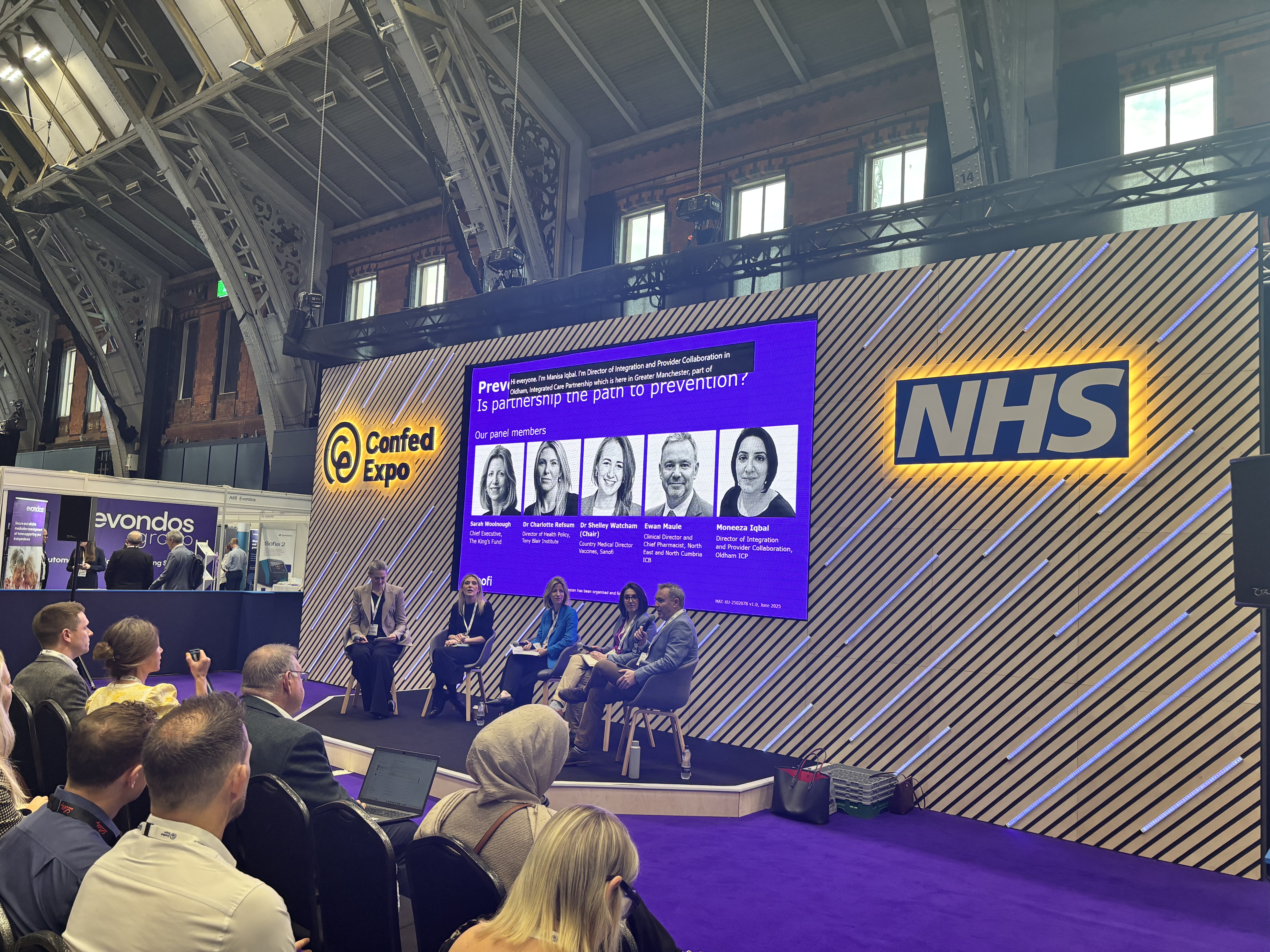NHS ConfedExpo was yet again a highlight in our calendar of events. We had a fantastic time connecting with partners old and new and listening to a wide range of impactful talks. This blog explores what we got up to and our key takeaways from the event.

NHS ConfedExpo is always a brilliant opportunity to hear from leading lights delivering change across the NHS and explore new collaboration opportunities. And this year was no exception.
From artificial intelligence to cancer care, our team attended a real breadth of insightful talks, workshops and presentations. Speakers drew from their experience in industry, academia and healthcare, highlighting how work in the NHS involves a vast range of multidisciplinary partners. It also reflects the huge diversity of healthcare services our NHS provides and the ongoing work to support staff and patients alike.
The importance of partnerships
We hosted two stands: our usual in the Health Innovation Hub and a new stand in partnership with the National Clinical Networks. The latter had clinical leads and our team on hand to deliver insights into our work driving innovation and adoption in healthcare in Wales.
This reflects our wider work with the National Clinical Networks. Our Board Member and National Clinical Director of the NHS Executive Wales, Dr. Meinir Jones, who attended the event and manned the stand, spoke about the significance of our collaboration.
“Developing a demand signalling approach and access through the networks to the wider clinical landscape is key in driving change and adopting new ways of working and innovations. Working in visibly in partnership with Life Sciences Hub Wales I believe is very attractive to industry partners as well as other sectors.”
Indeed, the importance of partnership was a major theme that ran across the course of the two days. In one of the opening talks, Lord Victor Adebowale, Chair of the NHS Confederation, summed this up by stating that “we work together or we fall apart.”
Joanne Oliver, a clinical lead and Networks Manager at NHS Wales Performance and Improvement, echoed this sentiment about collaborative working when talking about our partnership with the National Clinical Networks: “the collaborative approach to innovation and sharing of resource, knowledge and skillsets is powerful and helps with driving activity.”
Across the two days, speakers exemplified how partnerships are improving health outcomes. One example was detailed in the ‘Work smarter not harder: cancer care pathway mapping to drive more effective service redesign’ session. Here, we heard about the work between the Christie NHS Foundation Trust and Novartis, which includes supporting cancer patients in seamlessly navigating through the secondary care pathway and providing dedicated breast cancer clinical nurses, which freed up consultant time and improved patient experience.
Improving cancer care
In Wales alone, 19,500 people each year are diagnosed with cancer. Improving how we prevent, diagnose and treat cancer is essential for helping people to live healthier, happier and longer lives, and its importance was reflected across the event.
A big discussion point was the forthcoming National Cancer Plan set to be published by the Department of Health and Social Care, which Wes Streeting, Secretary of State for Health and Social Care, discussed in his speech, highlighting the importance of addressing inequalities while creating a new robust approach to tackling cancer.
The panel event ‘Cancer: Project Zero – enabling a world-leading National Cancer Plan’ considered how this strategy can help transform cancer outcomes alongside AstraZeneca’s bold aim to eliminate cancer as a cause of death.
This ambitious strategy is also underway in Wales, with a recent essay highlighting how circulating tumour DNA (ctDNA) is transforming cancer care through precision medicine
Speakers on this cross-sector panel included Bea Bakshi, CEO and Co-found of C the Signs, Lisa Galligan-Dawson, Director of Performance at the Greater Manchester Cancer Alliance, Alistair Greystoke, Professor of Oncology at Newcastle University and Anna Arent, Head of Oncology at AstraZeneca UK. They explored the importance of precision medicine, digital innovation such as AI and early intervention in cancer treatment.
The need for transformation
The pressures our healthcare system is facing was a huge theme across much of the conference. In his speech, Wes Streeting highlighted why we needed an evolution of the NHS, not just a top-down reorganisation, to get it fit for the future. The following points, which will be covered in the UK government’s upcoming 10-year health plan, were highlighted:
- Having clarity through clear outcomes and metrics with a streamlined infrastructure.
- Nurturing the next generation of NHS leaders to deliver change
Focussing on the power of the patient and including their voice and the value of patient outcomes in all work Alistair Greystoke, Clinical Senior Lecturer at Newcastle University, said in the ‘Cancer: Project Zero – enabling a world-leading National Cancer Plan’ talk that “uncertainty is the enemy of innovation.” Being bold and working decisively is essential if we want to create a healthcare system that works for everyone – patients and staff alike.
For those wanting to innovate within the NHS and drive transformation, ‘How to innovate and where to get started’ highlighted some of the support available, including the NHS Innovation Accelerator and SBRI Healthcare. The session also covered the need to centre patient perspective and standardise innovation processes to aid adoption.
The power of AI
AI was highlighted as real driver for transformation in our NHS across various talks. This included a fireside chat with speakers from Sword Medical, Royal Liverpool University Hospitals and Deep Medical which explored how AI-powered musculoskeletal care can ease NHS pressures. £2 billion is lost from NHS cancellations and no-shows. AI can help to reduce this.
The impact of AI was also highlighted in a unique interactive roundtable sponsored by Accenture which focused on ideas for sharing and scaling innovation and overcoming adoption barriers. ‘Realising the value of AI in NHS service delivery’ explored approaches to working with data and AI and got teams to work together to come up with solutions to challenges.
Speakers from Microsoft and Manchester University NHS Foundation Trust also gave a talk on how AI can streamline workflows through tools like Dragon Copilot, which helps to automate clinical documentation and reduce administrative burdens.
The conference was an inspiring couple of days, and our team left feeling invigorated by what is possible when we work together.
If we didn’t have a chance to chat but you’d like to learn about how we can work together and help drive innovation to the frontline of care, please get in touch by filling out our innovation enquiry form.

